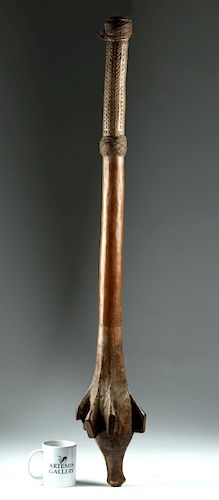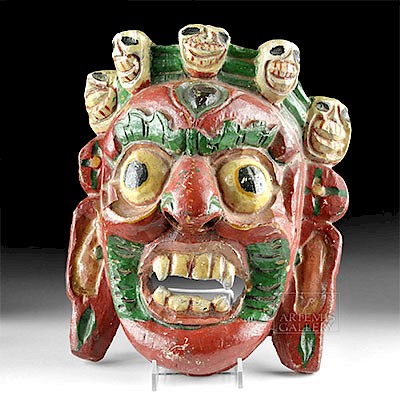Early 19th C. Fijian Rootstock Waka Vividrasa Club
Lot 116a
About Seller
Artemis Gallery
686 S Taylor Ave, Ste 106
Louisville, CO 80027
United States
Selling antiquities, ancient and ethnographic art online since 1993, Artemis Gallery specializes in Classical Antiquities (Egyptian, Greek, Roman, Near Eastern), Asian, Pre-Columbian, African / Tribal / Oceanographic art. Our extensive inventory includes pottery, stone, metal, wood, glass and textil...Read more
Estimate:
$3,000 - $4,500
Absentee vs Live bid
Two ways to bid:
- Leave a max absentee bid and the platform will bid on your behalf up to your maximum bid during the live auction.
- Bid live during the auction and your bids will be submitted real-time to the auctioneer.
Bid Increments
| Price | Bid Increment |
|---|---|
| $0 | $25 |
| $300 | $50 |
| $1,000 | $100 |
| $2,000 | $250 |
| $5,000 | $500 |
| $10,000 | $1,000 |
| $20,000 | $2,500 |
| $50,000 | $5,000 |
| $100,000 | $10,000 |
| $200,000 | $20,000 |
About Auction
By Artemis Gallery
Apr 25, 2019
Set Reminder
2019-04-25 10:00:00
2019-04-25 10:00:00
America/New_York
Bidsquare
Bidsquare : Pre-Columbian | Tribal | Ethnographic
https://www.bidsquare.com/auctions/artemis-gallery/pre-columbian-tribal-ethnographic-4035
Featuring ancient and ethnographic art from around the world, including Pre-Columbian, Native American, African / Tribal, Ethnographic, Spanish Colonial, Fossils, Fine Art, much more. Artemis Gallery info@artemisgallery.com
Featuring ancient and ethnographic art from around the world, including Pre-Columbian, Native American, African / Tribal, Ethnographic, Spanish Colonial, Fossils, Fine Art, much more. Artemis Gallery info@artemisgallery.com
- Lot Description
Oceania, Polynesia, Fiji Islands, ca. early 19th century CE. A hefty war club known as a "waka vividrasa" (translated as "fiber-bound root") from the Fijian Islands, hand-carved from incredibly dense rootstock. The lengthy body has a rounded profile and exhibits densely-carved zigzagging "tavatava" motifs along the stocky handle. Layers of original coconut sennet fibers are tightly wrapped around the bulbous pommel as well as the area just above the handle. The head of the club is optimized for skull-crushing efficiency with seven protruding rectangular tabs surrounding the upper knob-shaped projection. The words "I NAVEL" are carved between two of the tabs and likely signifies a later owner from missionary times on the islands sometime after the 1830s. Covered in lustrous caramel and coffee-hued patina, this is a rare and fabulously brutal example of durable Fijian weaponry! Size: 6.25" W x 42.625" H (15.9 cm x 108.3 cm).
The Waka Vividrasa club was a favorite weapon among the Fijian natives. It utilized the bludgeoning properties of a mace while still maintaining an elegant, uncomplicated form which could be wielded by even novice warriors. The chosen rootstock for any given club comes from a carefully cultivated sapling which, after harvesting, provides for an incredibly dense material from which a club can be carved. The globular striking head is shaped from the thick buttress area of the root and requires a substantial amount of practice and patience to carve so as to preserve its form throughout its lifespan.
While the two-handed club was created for swinging by the strongest of warriors, its primary purpose is one which stems from the macabre. The Fijian people view the head as one of if not the most important component of the human body as it is the conduit from which speech, thoughts, emotions, and the imagination originate; it is also considered the "trophy" of the body. Upon subduing or immobilizing an opposing soldier, Fijian warriors would utilize two-handed clubs like this example to symbolically "take" another individual's "trophy" by rearing a mighty swing and swiftly crushing their opponent's skull. This barbarous method of dispatching a foe imbued a warrior with great honor and high prestige from their fellow fighters, and enabled them to boast the coveted status of "Koroi," meaning "bravest warrior."
Provenance: private Honolulu, Hawaii, USA collection; ex-old collection of Alan Mann, London, England, United Kingdom
All items legal to buy/sell under U.S. Statute covering cultural patrimony Code 2600, CHAPTER 14, and are guaranteed to be as described or your money back.
A Certificate of Authenticity will accompany all winning bids.
We ship worldwide and handle all shipping in-house for your convenience.
#138261Small losses to portions of top projection, tabs, and coconut sennet threads just below head. Surface wear and abrasions commensurate with age and use, small nicks to tabs, top projection, body, and handle, fading to some incised lettering on head, several stable hairline fissures, and light desiccation to coconut sennet threads. Light earthen deposits as well as gorgeous lustrous patina throughout.Condition
- Shipping Info
-
All shipping is handled in-house for your convenience. Your invoice from Artemis Gallery will include shipping calculation instructions. If in doubt, please inquire BEFORE bidding for estimated shipping costs for individual items.
-
- Buyer's Premium



 EUR
EUR CAD
CAD AUD
AUD GBP
GBP MXN
MXN HKD
HKD CNY
CNY MYR
MYR SEK
SEK SGD
SGD CHF
CHF THB
THB















